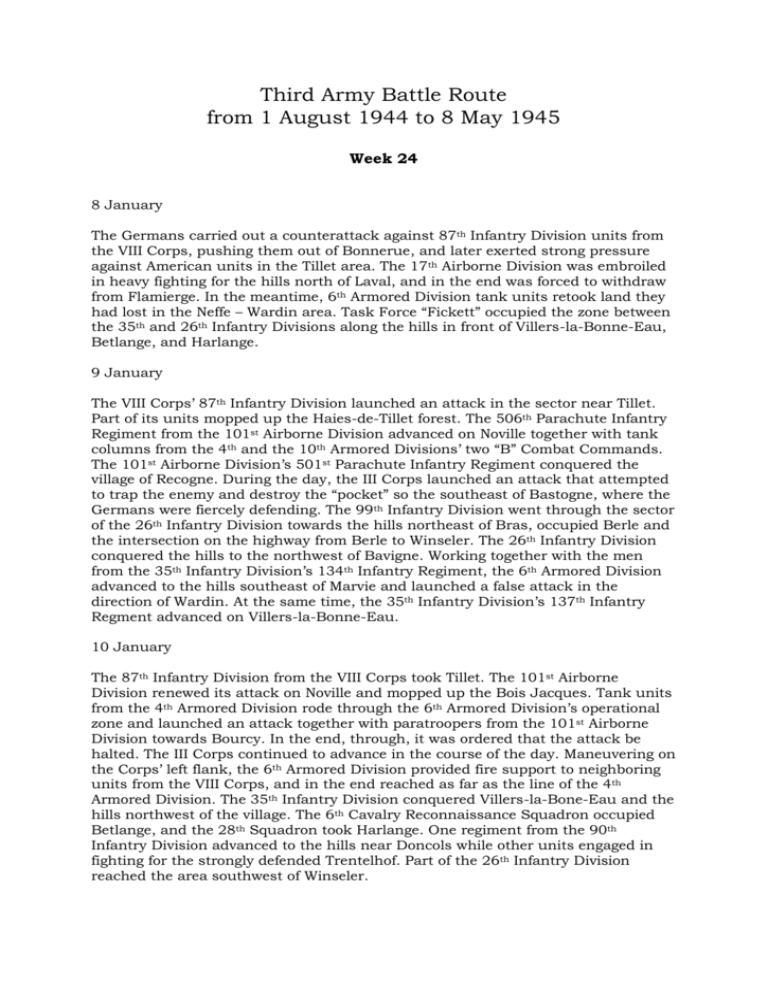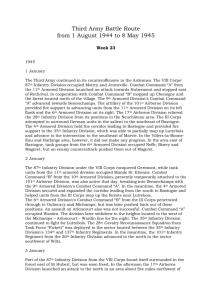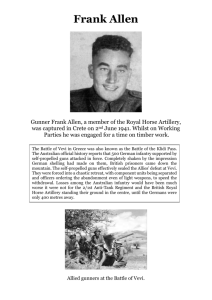Week 24: January 8 - 14, 1945
advertisement

Third Army Battle Route from 1 August 1944 to 8 May 1945 Week 24 8 January The Germans carried out a counterattack against 87th Infantry Division units from the VIII Corps, pushing them out of Bonnerue, and later exerted strong pressure against American units in the Tillet area. The 17th Airborne Division was embroiled in heavy fighting for the hills north of Laval, and in the end was forced to withdraw from Flamierge. In the meantime, 6th Armored Division tank units retook land they had lost in the Neffe – Wardin area. Task Force “Fickett” occupied the zone between the 35th and 26th Infantry Divisions along the hills in front of Villers-la-Bonne-Eau, Betlange, and Harlange. 9 January The VIII Corps’ 87th Infantry Division launched an attack in the sector near Tillet. Part of its units mopped up the Haies-de-Tillet forest. The 506th Parachute Infantry Regiment from the 101st Airborne Division advanced on Noville together with tank columns from the 4th and the 10th Armored Divisions’ two “B” Combat Commands. The 101st Airborne Division’s 501st Parachute Infantry Regiment conquered the village of Recogne. During the day, the III Corps launched an attack that attempted to trap the enemy and destroy the “pocket” so the southeast of Bastogne, where the Germans were fiercely defending. The 99th Infantry Division went through the sector of the 26th Infantry Division towards the hills northeast of Bras, occupied Berle and the intersection on the highway from Berle to Winseler. The 26th Infantry Division conquered the hills to the northwest of Bavigne. Working together with the men from the 35th Infantry Division’s 134th Infantry Regiment, the 6th Armored Division advanced to the hills southeast of Marvie and launched a false attack in the direction of Wardin. At the same time, the 35th Infantry Division’s 137th Infantry Regment advanced on Villers-la-Bonne-Eau. 10 January The 87th Infantry Division from the VIII Corps took Tillet. The 101st Airborne Division renewed its attack on Noville and mopped up the Bois Jacques. Tank units from the 4th Armored Division rode through the 6th Armored Division’s operational zone and launched an attack together with paratroopers from the 101st Airborne Division towards Bourcy. In the end, through, it was ordered that the attack be halted. The III Corps continued to advance in the course of the day. Maneuvering on the Corps’ left flank, the 6th Armored Division provided fire support to neighboring units from the VIII Corps, and in the end reached as far as the line of the 4th Armored Division. The 35th Infantry Division conquered Villers-la-Bone-Eau and the hills northwest of the village. The 6th Cavalry Reconnaissance Squadron occupied Betlange, and the 28th Squadron took Harlange. One regiment from the 90th Infantry Division advanced to the hills near Doncols while other units engaged in fighting for the strongly defended Trentelhof. Part of the 26th Infantry Division reached the area southwest of Winseler. 11 January The 347th Infantry Regiment from the 87th Infantry Division under the VIII Corps finished mopping up the Haies-de-Tillet forest and occupied Bonnerue, Pironpré, Vesqueville, and St Hubert. In the 17th Airborne Division’s zone, the Germans withdrew from the Heropont – Flamierge – Mande-St Etienne and Flamizoulle areas. In the III Corps’ zone, the Germans started to retreat from its positions southeast of Bastogne. Units from all of the Corps’ divisions now headed for Bras. The 6th Armored Division took over the sector that had originally been occupied by the 4th Armored Division. Part of the 6th Armored Division attacked Bras while other sectors mopped up the forests near Wardin. The 35th Infantry Division conquered additional hills in the Lutrebois – Lutremange area. Task Force “Fickett” occupied Watrange and attacked Tarchamps. It later went through the positions of the 26th Infantry Division’s Task Force “Scot”t and continued towards Sonlez, where it arrived at around midnight and made contact with units from the 90th Infantry Division. Task Force “Scott” mopped up the forest east of Harlange and, together with Task Force “Fickett”, conquered the hills southwest of Sonlez. Assault battalions from the 90th Infantry Division overcame resistance around Trentelhof, cut off the Bastogne – Wiltz highway, and advanced on Sonlez. The 26th Infantry Division improved its positions on the corps’ right flank. The XII Corps’ 80 th Infantry Division occupied Bockholz-sur-Sure and the hilly area south of Burden. The 2nd Cavalry Group (Mechanized) conquered Machtum, the final enemy foothold on the western bank of the Mosel River. 12 January In the sector of the VIII Corps, the Germans continued to retreat. The 87th Infantry Division occupied Tonny, Amberloup, Lavacherie, Orreux, Fosset, Sprimont, and the intersection northeast of Sprimont. The 17th Airborne Division retook Flamierge and Flamizoule, both of which had been heavily mined by the enemy. Renaumont, Hubertmont, and several other villages in the southwest were still occupied by week enemy holding forces during the day. The 6th Armored Division’s Combat Command “A” from the III Corps conquered Wardin and halted a few hundred yards in front of Bras. The 90th Infantry Division’s 357th Infantry Regiment mopped up Sonlez and continued to advance to the hills southeast of Bras while the 359th, deflected a counterattack against its position at the highway intersection northeast of Doncols. 13 January Assault battalions from the 87th Infantry Division VIII Corps advanced to the Ourthe River and made contact with British troops. The 17th Airborne Division took Salle, located north of Flamierge, without a fight. With units from the 101st and 17th Airborne Divisions returned to it, the 11th Armored Division attacked northwards along the Longchamps – Bertogne axis. In the end, the division cut off the main road between Houffalize – St Hubert near Bertogne. The 101st Airborne Division’s 506th Parachute Infantry Regiment occupied Foy, located on the main road between Bastogne and Houffalize. Its sister regiment, the 327th Glider Infantry Regiment advanced through the positions of the 501st Parachute Infantry Regiment in the Bois Jacques towards Bourcy. Combat Command “B” from the III Corps’ 6th Armored Division partially mopped up Mageret, and in the meantime the 90th Infantry Division pushed the enemy out of Bras and took Hill 530. The enemy deflected an attack launched by the 35th Infantry Division and Task Force “Fickett” near Bras. Units from the 26th Infantry Division advanced to the area northeast and east of Doncols. 14 January The 17th Airborne Division’s 507th Parachute Infantry Regiment from the VIII Corps entered Bertogne, which the enemy withdrew from without a fight. Its sister regiment, the 194th Glider Infantry Regiment occupied Givroule. Both regiments later continued together to the Ourthe River. A task force from the 11th Armored Division’s Combat Command “A” mopped up the forests near Falize and advanced along the main road between Longchamps and Compogne before it was halted by strong enemy fire. The 101st Airborne Division continued to attack towards the Noville – Rachamps – Bourcy line. Part of its units were pushed out of Recogne and Foy, but the paratroopers launched a swift counterattack to win back both of the villages. Followed by infantry troops, a tank unit from the 11th Armored Division’s Combat Command “B” entered Noville, but strong enemy fire later forced it to withdraw from the village. Combat Command “A” from the III Corps’ 6th Armored Division mopped up the woods east of Wardin and conquered Benonchamps while Combat Command “B” finished occupying Mageret. The men from the 90th Infantry Division advanced to Niederwampach. The 26th Infantry Division sent reconnaissance units out to the area south of the Wiltz River. The 94th Infantry Division from the XX Corps launched a series of local attacks to secure its positions in the Saar-Mosel triangle in the area south of Wasserbillig. The division’s 376 th Infantry Regiment occupied Tettingen and Butzdorf. Two battalions from the 95th Infantry Division advanced to the designated targets in the sector of the bridgehead near Saarlautern and, according to plan, later withdrew back to its original positions.







